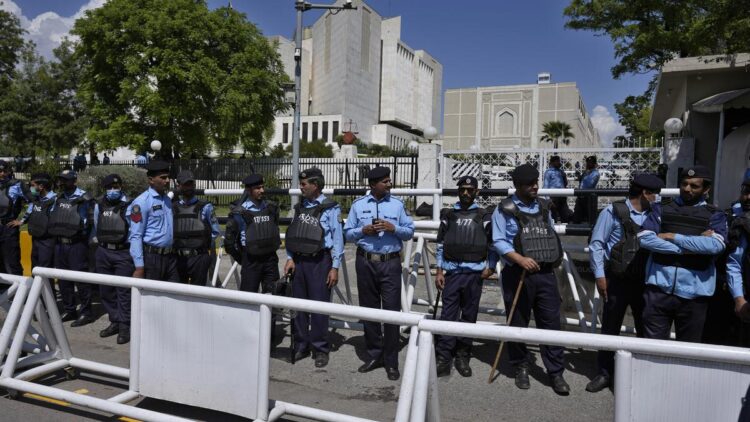[ad_1]

Police officers stand guard outside the Supreme Court to ensure security, in Islamabad, Pakistan, on April 4, 2023. Pakistan’s Supreme Court ruled a panel’s decision to delay provincial elections was unconstitutional and ordered the votes held by May 14.
| Photo Credit: AP
A divided Supreme Court and a political class split down the middle are only toppings for a country that appears to be in a permanently failing state as ordinary Pakistanis deal with runaway inflation, a depreciating rupee, and growth plummeting to 0.4%.
The inability of the Election Commission of Pakistan, the country’s Supreme Court and the executive government to agree on a date to hold elections in the provinces of Punjab and Khyber Pakhtoonkhwa are a sign that all institutions are in a race to the bottom.
Punjab, if the writ of a three-judge bench of the Supreme Court runs, will go to the polls on May 14 but Prime Minister Shehbaz Sharif and his government are loathing to release funds for the elections and provide security in an embattled country.
If we look at the past as practice, the “stallions of Rawalpindi”, to borrow a phrase from the Pakistani columnist, Ayaz Amir, would have been at the gates of Islamabad a long time ago. A few jeeps of the 111 Brigade, the favoured troops for coups, would have been stationed outside key locations in Islamabad (as happened last in 1999) and it would be curtains for a civilian government.
But the economic and political crises run so deep that Army Chief Asim Munir appears reluctant to take power unlike one of his predecessors, Pervez Musharraf, whose October 1999 coup created barely a ripple in Pakistan’s polity.
As Pakistan awaits financial bailout, a habit it has been unable to kick, time could be running out for an elite so used to living it up as ordinary folks toil to make ends meet. Without a fundamental restructuring of the country’s economy, a bailout would serve only to bring temporary respite to the elite.
On the political front, the man challenging the established order in Pakistan is none other than Imran Khan, who was a darling of the faujis, until things soured between him and the former Army Chief Qamar Javed Bajwa in 2022. Mr. Khan appears to have support from a section of the Supreme Court, whose actions have ensured the interests of the former Prime Minister.
Gen. Bajwa and his ilk turned again to the Pakistan Muslim League (N) of former Prime Minister Nawaz Sharif to stave off the challenge from Mr. Imran Khan, whose diehard supports think nothing of turning up in massive numbers to display their street power.
The PML (N), which is in coalition with the Pakistani People’s Party (PPP), appears unable to match Mr. Khan’s lung and street power in the absence of Mr. Nawaz Sharif, who is still in political exile in London.
With no agreement on when to hold provincial elections, civil society organisations have stepped into broker a deal with the warring political parties. Whether Mr. Khan and other leaders will agree on a deal to amend the Constitution to give cover to delayed provincial elections remains to be seen. And then to ensure free and fair elections to the National Assembly.
All of Pakistan’s power-hungry individuals and institutions are on trial. It remains to be seen if they can put nation above person to ensure that constitutional democracy lasts in the country.
[ad_2]
















